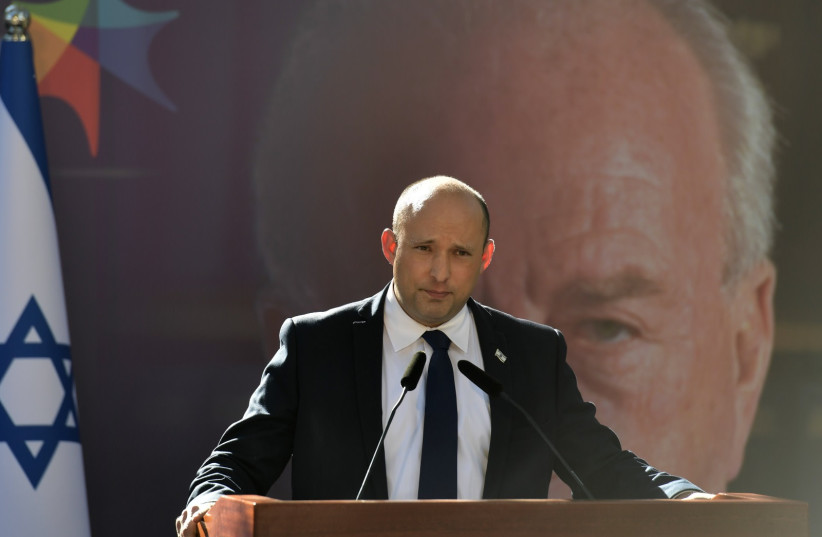“I felt like the moon, the stars, and the planets had fallen on me,” said Harry Truman about the moment in which he learned of Franklin Roosevelt’s death.
The accidental leader he then became actually turned out to be one of the best American presidents, the one who conceived Washington’s Cold War doctrine, spearheaded Europe’s reconstruction and stabilized the postwar world.
He was not alone.
Claudius, Caligula’s limping and stammering uncle, succeeded his assassinated nephew by accident, and then became one of Rome’s most effective emperors, expanding it to what now are Britain, Algeria and Austria.
Similarly, Yitzhak Shamir absorbed the biggest immigration wave in Israel’s history, even though he never planned to be prime minister and succeeded Menachem Begin only because of his abrupt departure.
Now Israel again has a prime minister as a result of “a political accident,” as he put it himself in a speech at the United Nations.
Four months after that accident, Naftali Bennett’s record also seems favorable, but his potential electorate remains largely unharnessed. Why?
BENNETT has already registered several achievements.
On the pandemic front, he blocked the Delta variant by taking the daring measure of ordering the third vaccination ahead of the medical establishment’s process. It was a gamble, and it worked.
On the economy, he took the parallel gamble of avoiding lockdowns, a choice that also proved wise. Also on that front, his government tabled a new budget, which is now in the process of being made law, ending the fiscal limbo that Bennett’s predecessor imposed.
On the civic front, Bennett confronted ultra-Orthodox politicians with a drive they had not faced in years. First, he established the commission of inquiry that is investigating the Mount Meron disaster, a probe that ultra-Orthodox leaders tried to prevent, evidently fearing its verdict.

Then his government introduced a reform of the Chief Rabbinate’s role in kashrut supervision, transforming it from manager to regulator. Ultra-Orthodox politicians will thus lose a repository of tax-paid jobs that spiked operational costs of thousands of restaurants and cafés.
In the same spirit, Bennett’s call in last week’s Jerusalem Post Conference to limit ultra-Orthodoxy’s political sway voiced Middle Israelis’ wrath in the face of one of our public sphere’s most glaring defects.
Lastly, on the international scene, the new government has picked up from where the previous one left off, opening embassies in the United Arab Emirates and Bahrain as well as a representation office in Morocco, which is planned to become an embassy as well.
In addition, Bennett was hosted by Egyptian President Abdel Fattah al-Sisi and by Jordan’s King Abdullah, and Foreign Minister Yair Lapid was hosted by Bahrain’s King Hamad bin Isa Al Khalifa, and Bennett was just invited to formally visit the UAE.
That’s quite a bit for a mere four months of incumbency, and that’s besides what might ultimately emerge as this government’s most important legacy, the war on the crime crisis in Israel’s Arab sector.
At this stage there is plenty to decry and nothing to celebrate on this bleeding front. However, the fact that Bennett is out to tackle this scourge with Arab politicians as part of his coalition, and the fact that he chose to personally head this effort, are further indication that at heart he is not a politician, but an entrepreneur, one whose eagerness to do is bigger than most politicians’ eagerness to talk.
Lastly, on the human-relations front, Bennett is keeping intact a bundle of political antagonists, mostly from backgrounds entirely different from his, like Meretz leader Nitzan Horowitz, with whom Bennett works closely on a daily basis in the former’s capacity as health minister.
Any other prime minister with such a first 120 days would have done well in polls. Why, then, does Bennett not break beyond his core following of 5% of the electorate?
BENNETT’S impact stems from his managerial abilities, but the electorate he needs is looking for something else.
Bennett’s electoral maneuver space is limited. The Left and Center-Left disagree with him, the far-Right hates him, and ultra-Orthodoxy now sees in him a strategic enemy. That leaves him with the Right and the Center-Right.
Within that narrowed field Bennett is further confined to the electorate that does not appreciate the culture of incitement and personality cult that Israelis now call Bibism. Among these voters, many appreciate the humility he has displayed and the sense of national appeasement he has instilled.
Yet this electorate is watching Bennett with skepticism; not because they disagree with any part of what he has so far done or said, but because they are waiting to see him build a real political structure.
Bennett’s electoral failure stems from his lack of a political organization.
The candidate list he fielded was assembled hastily and lacked first-row public figures. Unlike Lapid, he attracted no literati like Ruth Calderon and Aliza Lavie, no groundbreaking women like Maj.-Gen. (res.) Orna Barbivay, no senior bankers like former Mizrahi Bank CEO Yaakov Peri, no social leaders like paraplegic Energy Minister Karin Elharrar, and no senior security figures like Ram Ben-Barak, a former deputy head of the Mossad, or Mickey Levy, a former Jerusalem District police commander.
Bennett must emulate this model, and he should start this journey by merging his faction with Justice Minister Gideon Sa’ar’s New Hope.
There are no ideological differences between the two, and they are working well together. With a combined 12 Knesset seats they will form a political power base and an electoral magnet. Their message will be simple: we are the real Likud, the successors of Menachem Begin and the national liberalism in which he believed and for which he fought.
Public heavyweights will then begin gravitating Bennett’s way, as will new voters, realizing he is no longer an accidental leader.
The writer’s bestselling Mitzad Ha’ivelet Ha’yehudi (The Jewish March of Folly, Yediot Sefarim, 2019), is a revisionist history of the Jewish people’s leadership from antiquity to modernity.
